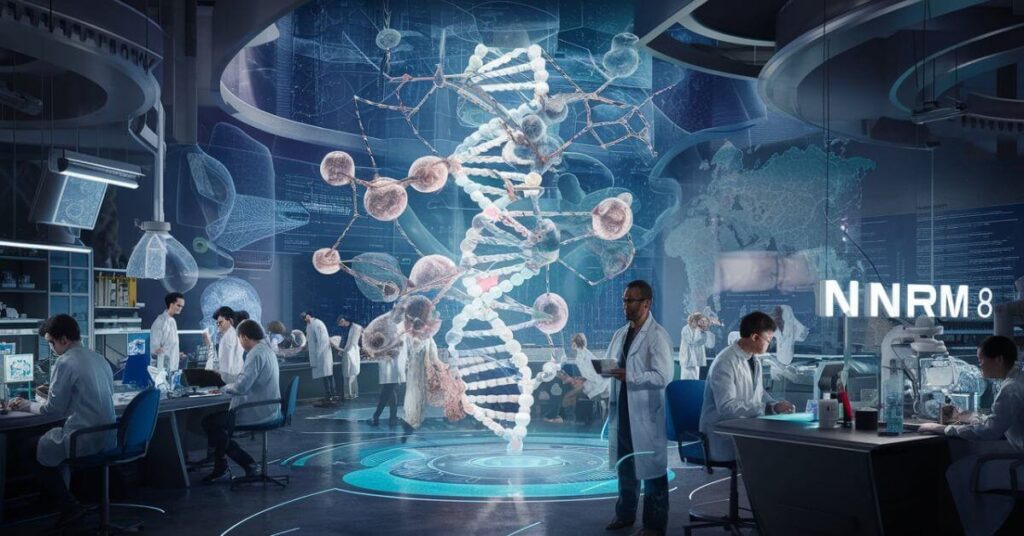Understanding NNRM28: A Deep Dive into Cutting-Edge Research and Innovation

In the ever-evolving landscape of scientific research, NNRM28 emerges as a pivotal initiative dedicated to advancing the fields of genetic engineering, regenerative medicine, and bioinformatics. This comprehensive article delves into the core aspects of NNRM28, offering an in-depth exploration of its impact, relevance, and future potential. Through detailed analysis and unique insights, we aim to provide a thorough understanding of this groundbreaking initiative.
What is NNRM28?
NNRM28, short for National Network for Research in Medical and Genetic Sciences, is a forward-thinking research initiative with a focus on pivotal areas of modern science. This program is designed to support and advance research efforts in genetic engineering, regenerative medicine, and bioinformatics, among other fields. The goal of NNRM28 is to leverage state-of-the-art technology and innovative methodologies to tackle complex biological and medical challenges. Through its multifaceted approach, NNRM28 aims to foster significant advancements that have the potential to transform scientific understanding and improve human health.
The Role of NNRM28 in Genetic Engineering
Genetic engineering stands at the forefront of scientific innovation, offering transformative possibilities across a range of applications. NNRM28 plays a critical role in this field by providing support and resources for cutting-edge research and technological development.
Innovations in Genetic Engineering
- Gene Editing Techniques: At the core of genetic engineering is the ability to edit genes with precision. NNRM28 supports advancements in technologies such as CRISPR-Cas9, which enable scientists to make targeted modifications to DNA. This technology holds immense promise for treating genetic disorders, enhancing agricultural practices, and developing new therapeutic approaches.
- CRISPR-Cas9: CRISPR-Cas9 is a revolutionary gene-editing tool that allows for precise alterations to the genome. NNRM28’s support facilitates research into optimizing this technology, making it more efficient and applicable to a broader range of genetic conditions.
- Ethical and Safety Considerations: As gene-editing technologies advance, ethical and safety concerns become increasingly important. NNRM28 addresses these issues by funding research into the ethical implications of genetic modifications and ensuring that technologies are developed and used responsibly.
- Synthetic Biology: NNRM28 is also committed to advancing synthetic biology, a field that involves designing and constructing new biological systems and organisms. This area of research has the potential to create novel solutions for medical, industrial, and environmental challenges.
- Designing Synthetic Organisms: By supporting research into synthetic organisms, NNRM28 helps drive innovations that could lead to new treatments, bioengineered materials, and environmental solutions.
- Applications and Impact: Synthetic biology applications range from creating biofuels and biodegradable materials to developing new medical therapies. NNRM28’s efforts in this field contribute to a wide array of potential benefits for society.
- Personalized Genomics: Personalized genomics involves tailoring medical treatments and interventions based on an individual’s genetic profile. NNRM28 supports research into personalized medicine, which aims to provide more targeted and effective treatments.
- Genomic Data Analysis: By funding research into advanced genomic analysis techniques, NNRM28 contributes to the development of personalized treatment plans that consider an individual’s unique genetic makeup.
- Precision Medicine: The goal of personalized genomics is to enhance the efficacy of medical treatments. NNRM28’s support for this area of research helps pave the way for more precise and effective healthcare solutions.
NNRM28’s Impact on Regenerative Medicine
Regenerative medicine focuses on repairing or replacing damaged tissues and organs, offering the potential for groundbreaking treatments for various medical conditions. NNRM28’s involvement in this field is crucial for advancing research and developing new therapies.
Key Contributions to Regenerative Medicine
- Stem Cell Research: Stem cells have the unique ability to develop into various types of cells, making them a key focus of regenerative medicine research. NNRM28 supports investigations into stem cell biology, which could lead to novel treatments for diseases and injuries.
- Stem Cell Therapy: Research into stem cell therapy aims to develop treatments for conditions such as spinal cord injuries, heart disease, and diabetes. NNRM28’s funding helps advance these therapies, bringing us closer to effective treatments.
- Challenges and Solutions: Stem cell research faces challenges related to cell sourcing, differentiation, and integration. NNRM28’s support addresses these challenges by funding research into overcoming these obstacles and improving therapeutic outcomes.
- Tissue Engineering: Tissue engineering involves creating artificial tissues and organs for transplantation and repair. NNRM28 supports research in this area to develop more effective tissue constructs and enhance the field’s overall capabilities.
- Biomaterials and Scaffolds: Research into biomaterials and scaffolds is essential for tissue engineering. NNRM28’s funding helps advance the development of materials that can support cell growth and tissue formation, leading to improved transplantation outcomes.
- Clinical Applications: Tissue engineering has the potential to address the shortage of organ donors and improve the success rates of transplants. NNRM28’s support helps translate laboratory research into clinical applications.
- Regenerative Medicine Technologies: NNRM28 supports the development of new technologies for regenerative medicine, including advanced imaging techniques and bioengineering tools.
- Imaging and Monitoring: Advanced imaging technologies allow researchers to monitor the progress of regenerative treatments and assess the effectiveness of new therapies. NNRM28’s funding contributes to the development of these technologies.
- Bioengineering Innovations: Bioengineering innovations, such as 3D bioprinting, play a significant role in regenerative medicine. NNRM28 supports research into these technologies, which can create complex tissue structures and improve therapeutic options.
Advancements in Bioinformatics Through NNRM28
Bioinformatics involves the application of computational tools to analyze biological data, providing insights that drive scientific discovery. NNRM28’s support in this field enhances our ability to process and interpret complex datasets.
Contributions to Bioinformatics
- Data Integration and Analysis: NNRM28 funds research into bioinformatics tools that integrate data from various sources, including genomic, proteomic, and metabolomic data. This integration is crucial for understanding complex biological systems and disease mechanisms.
- Multi-Omics Approaches: Combining data from multiple omics layers (genomics, proteomics, etc.) provides a more comprehensive view of biological processes. NNRM28’s support helps develop tools for integrating and analyzing these diverse data types.
- Systems Biology: Systems biology aims to understand how different biological components interact within a system. NNRM28’s funding contributes to research in this area, enhancing our understanding of complex biological networks.
- Predictive Modeling: Predictive modeling uses computational models to forecast biological outcomes and guide experimental design. NNRM28 supports research into predictive modeling techniques that can improve drug development and personalized medicine.
- Machine Learning and AI: Machine learning and artificial intelligence are increasingly used in bioinformatics to analyze large datasets and predict outcomes. NNRM28’s funding supports the development of these advanced tools and techniques.
- Drug Discovery: Predictive modeling can accelerate drug discovery by identifying potential drug targets and predicting drug interactions. NNRM28’s support helps advance this research, potentially leading to faster development of new therapies.
- Big Data in Biology: The growth of biological data requires sophisticated tools for analysis. NNRM28 supports research into big data analytics, which can uncover patterns and insights that traditional methods might miss.
- Data Management and Storage: Managing and storing large volumes of biological data is a significant challenge. NNRM28’s funding supports the development of solutions for efficient data management and storage.
- Advanced Analytics: Advanced analytics techniques, such as data mining and statistical analysis, are essential for extracting meaningful information from big data. NNRM28’s support helps advance these techniques, contributing to scientific discovery.
The Future of NNRM28 and Its Potential Impact
Looking ahead, NNRM28’s commitment to supporting research in genetic engineering, regenerative medicine, and bioinformatics promises to drive significant advancements and innovations. The initiative’s future directions include fostering interdisciplinary research, expanding collaborations, and engaging with the public.
Future Directions
- Interdisciplinary Research: NNRM28 is likely to promote interdisciplinary research that combines insights from genetic engineering, regenerative medicine, and bioinformatics. This integrated approach can lead to new discoveries and more effective solutions.
- Collaborative Projects: Interdisciplinary research often involves collaborative projects that bring together experts from different fields. NNRM28’s support for such projects can enhance the scope and impact of research efforts.
- Innovative Solutions: Combining expertise from multiple disciplines can lead to innovative solutions that address complex scientific and medical challenges. NNRM28’s focus on interdisciplinary research can drive significant progress in these areas.
- Collaborations and Partnerships: Expanding collaborations with other research institutions, industry partners, and governmental agencies is a key focus for NNRM28. These partnerships can enhance research capabilities and accelerate the translation of discoveries into practical applications.
- Public-Private Partnerships: Collaborations between public research institutions and private companies can provide additional resources and expertise. NNRM28’s support for such partnerships can drive innovation and accelerate progress.
- International Collaborations: Global collaborations can bring together diverse perspectives and expertise. NNRM28’s involvement in international research initiatives can enhance the impact of its efforts and contribute to global scientific advancement.
- Public Engagement and Education: Engaging with the public and educating them about the benefits and ethical considerations of advanced scientific research is an important aspect of NNRM28’s future efforts.
- Outreach Programs: NNRM28’s outreach programs aim to inform the public about the potential benefits of research and address any concerns related to ethical issues. These programs can build support for scientific initiatives and promote informed discussions.
- Educational Resources: Providing educational resources and opportunities for students and professionals can foster a greater understanding of advanced research areas. NNRM28’s support for educational initiatives can help inspire the next generation of scientists and researchers.
FAQs About NNRM28
What does NNRM28 stand for?
NNRM28 stands for the National Network for Research in Medical and Genetic Sciences. It is a research initiative dedicated to advancing knowledge and technology in genetic engineering, regenerative medicine, and bioinformatics.
How does NNRM28 support genetic engineering research?
NNRM28 supports genetic engineering research by funding and facilitating the development of advanced gene-editing technologies, synthetic biology, and personalized genomics. Its goal is to drive innovations that can improve medical treatments and agricultural practices.
What are some key areas of focus in regenerative medicine under NNRM28?
Key areas of focus include stem cell research, tissue engineering, and regenerative medicine technologies. NNRM28’s support helps advance these areas to develop new therapies for damaged tissues and organs.
How does NNRM28 contribute to bioinformatics?
NNRM28 contributes to bioinformatics by funding research into data integration and analysis, predictive modeling, and big data analytics. These contributions help scientists analyze complex biological data and make significant discoveries.
What is the future outlook for NNRM28?
The future outlook for NNRM28 includes expanding interdisciplinary research, forming new collaborations, and engaging with the public to promote understanding and support for advanced scientific research.
Conclusion
NNRM28 is a pivotal initiative at the forefront of research in genetic engineering, regenerative medicine, and bioinformatics. Its support for cutting-edge technologies and innovative approaches promises to drive significant advancements in these fields. By focusing on ethical considerations, fostering collaborations, and engaging with the public, NNRM28 is well-positioned to continue making impactful contributions to science and medicine. The future of NNRM28 holds great promise, with potential breakthroughs that could transform our understanding of biology and improve human health on a global scale.








